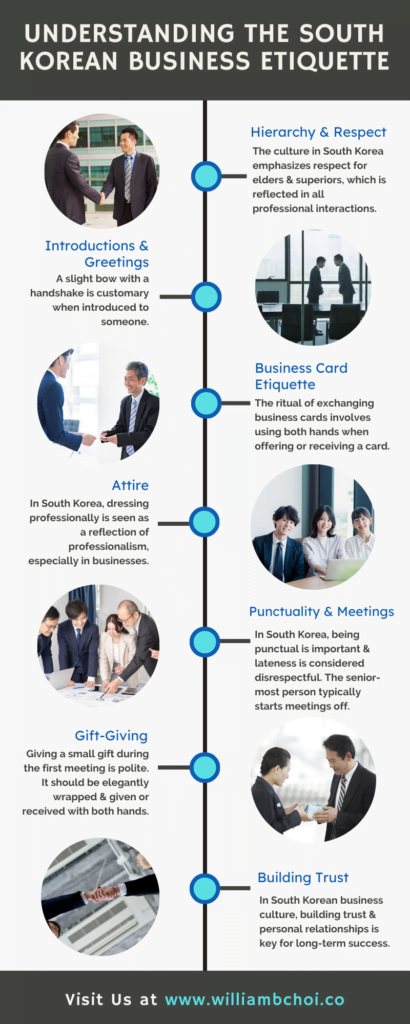Business Networking in South Korea: Maximizing Your Opportunities
In this article, we will be discussing business networking in South Korea. We will also be looking at how to network in the country, understanding the unique business etiquette, and the significance of networking with both local business leaders and other foreigners.
An East Asian nation covering the southern half of the Korean peninsula, South Korea exemplifies the tradition-modernity fusion. Business professionals from North America and Europe will find abundant opportunities in the country’s vibrant economy and innovative landscape. However, the extent of networking is a determining factor for success in this dynamic market. From tech startups and SMEs to executives eyeing the South Korean market, it is vital to understand and embrace the local networking culture.
William B. Choi specializes in guiding businesses through the complex South Korean commercial landscape. With insights based on experience and expertise, businesses are guided to build invaluable relationships for a successful venture. For a detailed consultation, contact us today.
The Importance of Networking in South Korea
As with any business environment, networking is critical to establishing the connections that will drive your business forward.
William B. Choi
Networking plays a pivotal role in the competitive South Korean economy. Personal relationships and trust lay the foundation for transactions and collaborations. This is a society where word-of-mouth is of considerable significance. A robust network can open doors to partnerships, collaborations, and invaluable market insights. If you’re starting a business in South Korea, networking is critical.
Here are some reasons why networking plays a pivotal role in South Korea:
Building Trust and Credibility
The core of the South Korean business culture comprises trust and personal relationships. As much as a deal is an agreement between companies, it is also about building a relationship between individuals.
Building a network of reliable contacts can pave the way for successful business partnerships; a recommendation or introduction from a known contact can significantly elevate credibility.
Access to Opportunities
Personal references and word-of-mouth often present potential opportunities in South Korea. From finding a local distributor or securing an investment to landing a significant contract, a well-connected advocate can help make a difference.
Navigating Cultural Nuances
Despite its modern and innovative scene, South Korea values traditions. Influenced by Confucian principles, the business etiquette here is symbolized by respect and hierarchy.
A robust network can guide foreigners to understand and navigate the cultural subtleties.
Risk Mitigation
Like any other business ecosystem, South Korea has its challenges. Networking can help gauge the reliability of potential partners, clients, or vendors. It helps ensure businesses align with credible entities and avoid potentially deleterious associations.
Local Market Insights
In the dynamic and rapidly evolving South Korean market, foreign businesses will benefit by networking with local experts. It provides real-time insights and an understanding of market trends to help make informed decisions.
This local knowledge is invaluable for adapting services, products, or marketing strategies to resonate with Korean customers.
Long-term Business Stability
In South Korea, business relationships aren’t fleeting; they’re nurtured over time, often lasting for years. Effective networking lays the foundation for such enduring partnerships, ensuring businesses have a stable foothold and prolonged support.
Understanding the South Korean Business Etiquette
To successfully navigate the dynamic South Korean business landscape, understanding its business etiquette – a blend of modern practices and age-old traditions – is essential.

Some of the critical elements of the South Korean business etiquette include:
Hierarchy and Respect
The South Korean culture holds the highest respect for elders and superiors, and this hierarchy is visible in all interactions – when greeting, addressing, or even in decision-making. Age and rank govern the course of action.
It’s essential to acknowledge and adhere to this structure, ensuring interactions are courteous and respectful where appropriate.
Introductions and Greetings
A traditional bow is a common form of greeting. However, handshakes have become prevalent, particularly in business settings. A slight bow with a handshake is customary when introduced to someone.
It’s polite to support your right forearm with your left hand during a handshake while ensuring your grip isn’t too strong.
Business Card Etiquette
The ritual of exchanging business cards involves using both hands when offering or receiving a card. Always take a moment to study the card before placing it on the table or cardholder; this shows respect.
Ensure business cards have a Korean translation, preferably on the reverse side, indicating name and position.
Attire
Appearance is a matter of pride for South Koreans, especially in business environments. Typically, men can be seen in well-tailored, dark-colored suits, white shirts, and dark ties. Professional attire for women must be modest and conservative. A clean and crisp attire reflects professionalism.
Punctuality and Meetings
Punctuality is crucial in South Korea; arriving late is considered a sign of disrespect. However, a call to inform the concerned party is appreciated if you’re running late due to unavoidable circumstances.
When visiting South Korea for business and networking events, book a hotel near your meeting locations to avoid the usually heavy traffic.
William B. Choi
Generally, meetings start with the exchange of light pleasantries, followed by the main discussion. It’s polite to wait for the senior-most person to initiate proceedings.
Gift-Giving
Presenting a small gift, especially during the first meeting, is considered courteous. Popular gifts include high-quality liquor, chocolates, or items from your home country. Elegantly wrapped gifts must be given or received with both hands.
Social Engagements
Beyond the formal meetings, dinners, drinks, and karaoke sessions are common. Such engagements, while relaxed, are extensions of the business relationship.
Participating in these activities is recommended, as is maintaining decorum and respecting boundaries.
Indirect Communication
Since direct refusal or disagreement is considered rude, South Koreans often communicate indirectly, avoiding confrontation or causing ‘loss of face.’
Look out for non-verbal cues, hesitations, or polite diversions; these are indicative of uncertainty or disagreement.
Building Trust
Personal relationships (inmaek) and trust comprise the foundation of South Korean business culture. Apart from contracts and agreements, cultivating personal bonds is significant.
Invest time building these relationships, understanding your partners, and showing genuine interest to reap long-term benefits.
Networking with Local Business Leaders

With their deep understanding of the South Korean market and extensive influence, local business leaders can serve as gateways to several opportunities. To truly make an impact in the market beyond a solid business plan or an innovative product, it’s essential to forge meaningful connections with local business leaders.
To successfully network with South Korea’s business elite,
- Participate in Local Business Forums: Business events, seminars, and forums are the perfect platforms to meet local leaders, understand industry trends, and position oneself as a serious business professional keen on entering the South Korean market.
- Engage in Social Gatherings: Accept invitations to post-meeting dinners or outings to display commitment and a genuine interest in forging a bond. Use these informal settings to convey your business values and visions subtly.
- Leverage Mutual Contacts: Explore your existing network to find mutual connections. An introduction or endorsement from a trusted contact can lead to more open and fruitful conversations.
- Invest in Language and Cultural Training: While many Korean business leaders speak English, a basic understanding of Korean can make a significant difference. Simple greetings or thank yous in Korean reflect respect for the culture.
- Stay Updated with Local News: Staying updated with South Korea’s economic and industry news can make conversation starters. Demonstrating knowledge about local developments reflects a genuine interest in the market and can impress business leaders.
- Follow-up and Nurture: Send a thank you note or email expressing gratitude after the first meeting. Regularly share updates or industry news that might interest them and touch base.
Connecting with Other Foreigners in South Korea
With its expanding global influence, South Korea attracts a diverse array of foreign professionals, entrepreneurs, and expats. Apart from establishing connections with local business leaders, it’s equally vital to network with fellow foreigners who can provide first-hand insights, share relatable challenges, and often form the base for an initial support system.
Here’s how to effectively connect with other foreigners in the South Korean business scene:
- Engage in Online Communities: Platforms like Facebook groups dedicated to foreigners in South Korea or Expat.com provide a digital space to connect, seek advice, ask questions, and organize meetups.
- Join International Chambers of Commerce: Organizations such as the American Chamber of Commerce in Korea (AMCHAM) or the European Chamber of Commerce in Korea offer networking opportunities, seminars, and events catering to foreign business professionals.
- Engage in Expat Business Forums: Cities like Seoul and Busan frequently host expat business meetups and forums. These events, tailored for foreign professionals, provide an excellent platform for networking and discussing challenges in the expat community.
- Attend Cultural Exchange Events: South Korea regularly hosts cultural exchange events to promote international harmony. Such events, while focusing on cultural experiences, also provide a platform to meet other locals and foreigners alike.
Connecting with foreigners who’ve been in South Korea longer can be beneficial. They can share their experiences, offer guidance, and introduce you to broader networks, helping you navigate initial challenges smoothly.
Navigating the Digital Landscape for Networking
Understanding local technology, such as social media platforms and communication apps, will help you with networking.
William B. Choi
South Korea, being a tech-savvy nation, has an affinity for integrating the latest digital trends into daily life, extending to the realm of professional networking. Business professionals seeking to enter the South Korean market must understand and navigate the nation’s digital networking landscape.
Stay Updated with Digital Trends
Platforms like Naver, Daum, and Kakao constantly roll out new features that can be leveraged for networking. Watch these trends and adapt your digital networking strategies accordingly.
Harness the Power of Jobplanet
A prominent platform in South Korea, Jobplanet offers more than just job listings. It also provides insights into companies and allows networking opportunities and users to connect with potential employers or business partners.
Engage on KakaoTalk
KakaoTalk, a messaging app in South Korea, is frequently used by professionals for business communication. With an active KakaoTalk profile and being available for quick chats can expedite networking endeavors.
Participate in Naver Café Discussions
South Korea’s leading search engine, Naver, has community platforms called ‘Cafés.’ These are topic-specific forums where professionals discuss industry trends, share news, and network. Identify relevant Cafés and actively participate.
Utilize Virtual Business Forums
Virtual business seminars, webinars, and online forums have gained traction in South Korea. Attend these events, engage in discussions, and connect with other attendees for digital network expansion.
Overcoming Challenges in South Korean Business Networking
The rich cultural tapestry of South Korea, coupled with its rapid technological advancements, presents unique challenges for foreign professionals. However, one can overcome some of the most common hurdles with adaptability, understanding, and tact.
Study up on local customs and business etiquette to avoid offending local business people.
William B. Choi
Cultural Nuances
Invest time to understand the cultural nuances emphasizing respect, hierarchy, and social harmony. Cultural immersion programs, workshops, or hiring a local consultant can offer insights and tools to navigate them.
Language Barrier
Consider introductory Korean language courses. Even a few phrases can go a long way in building rapport. Alternatively, employing a translator for crucial meetings will ensure clear communication.
Building Genuine Trust
Trust isn’t given instantly; it’s cultivated over time. Ensure genuine interactions, consistently follow through on commitments, and invest time in understanding counterparts.
Hoesik (social gatherings after business meetings) are common and provide an informal setting to build trust.
Local Business Customs
Prior research and keen observation can help understand local business customs. When in doubt, it’s wise to mirror the actions of a Korean counterpart or seek guidance from local colleagues.
Regional Differences
South Korea has regional cultural and business differences. What works in Seoul might not be as effective in Busan. It helps to research the specific regions of interest. Engage local advisors or representatives from each area for tailored insights.
Legal and Regulatory Hurdles
South Korea’s regulatory environment can be challenging for foreign businesses. Consider partnering with local legal firms or consultants for guidance on regulatory compliance. This helps prevent unforeseen legal challenges from hampering networking efforts.
Success Stories: How Proper Networking Can Propel Your Business
There are abundant stories of South Korean foreign enterprises that harnessed the power of effective networking and carved a niche for themselves.
HealthTech Harmony
A global HealthTech firm sought to pilot its telemedicine platform in East Asia, primarily targeting South Korea. However, established local competitors and stringent regulations posed challenges.
Networking at a Korean healthcare symposium got the firm’s CEO to connect with policymakers and local health practitioners. These relationships facilitated regulatory navigation with ease while also fostering collaborations with local clinics, ensuring a successful pilot.
Eco-Entrepreneur Success
A young Australian entrepreneur wanted to tap into South Korea’s progressive eco-conscious market with eco-friendly household solutions. She used digital networking platforms popular in Korea to engage in virtual discussions, webinars, and forums. This culminated in partnerships with prominent Korean e-commerce platforms, transforming her venture into a household name in South Korea’s eco-circles.
Common Questions About Business Networking in South Korea
Why is business networking crucial in South Korea?
The country’s emphasis on trust and personal relationships in professional dealings makes business networking in South Korea vital. Rooted in Confucian values, South Korea’s business culture prioritizes interpersonal connections and endorsements.
Networking helps build credibility, facilitates introductions, and provides opportunities that might be inaccessible otherwise. It ensures foreign professionals can navigate the market’s nuances, foster long-term partnerships, and establish rapport.
Are digital networking platforms popular in South Korea?
Yes, digital networking platforms are pretty popular in South Korea. Platforms like LinkedIn have a growing presence, while native platforms like KakaoTalk and Naver Café play pivotal roles in professional networking.
Alongside traditional networking, these platforms cater to the nation’s tech-savvy population, offering diverse opportunities for professionals to connect, collaborate, and expand their reach.
How do South Korean business leaders perceive foreign companies?
South Korean business leaders generally perceive foreign companies as opportunities for collaboration, global expansion, and innovation. While they value local business practices and traditions, they also recognize the benefits of international partnerships, such as access to technologies, ideas, and new markets.
The key to successful engagement is mutual respect, understanding Korean business etiquette, and building long-term relationships. Foreign companies that demonstrate these qualities can gain trust and favorability.
How can one ensure long-term networking success in the South Korean market?
To ensure long-term networking success in the South Korean market, one must invest in “inmaek” (building genuine personal relationships). It’s essential to understand and respect local business etiquette, consistently follow through on commitments, and demonstrate a long-term interest in the Korean market.
Regular engagement, participation in local business events, and adapting to cultural nuances can foster trust, ensuring positive professional connections in the relationship-driven business landscape.
Final Thoughts on Business Networking in South Korea
South Korea’s economic landscape offers many opportunities and possibilities for the discerning business professional. Understanding the networking rhythm is crucial in this land that displays an impressive balance of innovation and tradition.
Consult with William B. Choi today for tailored strategies and a guided journey.






